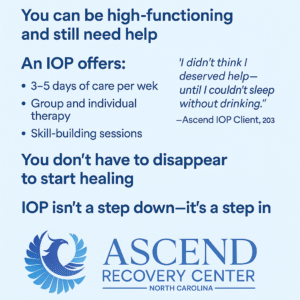You show up. You get things done. You’ve built a life people respect. On the surface, you’re managing. But underneath? You’re tired. Edgy. Quietly overwhelmed.
And lately, your relationship with alcohol or substances feels different. Heavier. More necessary.
Someone might’ve mentioned treatment. Maybe you Googled it once or twice. But every time you imagine stepping away from work, family, or just the rhythm of your life, it feels impossible. You’re not in crisis. But you’re not okay, either.
This is where an intensive outpatient program in Charlotte—IOP—can be a lifeline. At Ascend North Carolina, we meet people who look “fine” from the outside but know something is off on the inside. IOP is the middle ground that respects your life and your pain.
You Can Be High-Functioning and Still Need Help
There’s a quiet shame that comes with managing well but feeling bad. You tell yourself:
- “Other people have it worse.”
- “I’m not drinking that much.”
- “I can stop anytime—just not this week.”
The truth? High-functioning doesn’t mean healthy. And it doesn’t mean happy. You can be successful, present, and productive—and still feel like something is slowly unraveling inside.
If you’re using substances to sleep, escape, or push through… that matters. If you feel hollow, numb, or always on edge… that matters, too.
You don’t need to hit bottom to deserve a better way of living.
What an IOP Actually Offers (That Traditional Therapy Might Not)
Many people in your shoes try individual therapy first. And that’s a great starting point. But if therapy hasn’t helped you create real change—or if you find yourself repeating the same patterns every week without traction—you might need more structure.
An intensive outpatient program typically includes:
- Three to five days per week of care
- Group therapy with peers who understand pressure and burnout
- Individual sessions with a clinician who sees the full picture
- Skill-building (like managing cravings, handling conflict, and regulating emotion)
- Flexible scheduling so you can continue working or parenting
It’s a system of care that wraps around your life instead of taking you out of it.
One Client’s Story: “I Didn’t Think I Deserved Help—Until I Couldn’t Sleep Without Drinking”
“I had a good job. I paid my bills. I didn’t black out or cause scenes. But I needed a drink just to wind down. And two to fall asleep. Then one morning, I had a drink before my Zoom meeting. That’s when I knew. I didn’t want rehab—I wanted something real that fit my life. IOP gave me structure and space to start untangling the reasons I couldn’t stop.”
— Ascend IOP Client, 2023
This is the kind of story we hear often at Ascend. Not dramatic. Not rock bottom. Just a quiet moment of reckoning—and a choice to do something before things got worse.

You Don’t Have to Disappear to Start Healing
One of the biggest barriers for high-functioning professionals, parents, and caregivers is the idea that getting help means stepping away from everything.
IOP changes that equation. You attend care several times a week—then you go home. You go to work. You show up for life, with more clarity and support.
That means you get to practice what you’re learning while you’re living. You bring your real stressors into group or individual sessions and build tools you can actually use—immediately.
When Image Is Everything, IOP Gives You a Space to Be Real
The truth is, high-functioning people are often praised for their performance. You’re the responsible one. The achiever. The glue.
But that image comes with pressure. It can make vulnerability feel dangerous. Exhausting. Even disloyal to the version of yourself others rely on.
In IOP, you don’t have to hold that mask. You can show up tired, confused, guarded—and still be met with respect.
No one is going to tell you to throw your life away. We’re here to help you reconnect with it—on your terms.
IOP Isn’t a Step Down—It’s a Step In
If you’re thinking, “I’m not the kind of person who needs treatment,” pause for a moment. That thought might be part of the reason things feel stuck.
IOP isn’t for “those people.” It’s for this moment—when you’re not in crisis, but not okay either.
When you’ve tried to manage it on your own and want something that actually helps. When you don’t want to blow up your life—you just want to stop hiding in it.
At Ascend North Carolina, our IOP clients are professionals, parents, students, caretakers—people who’ve lived a long time in the gray zone between “fine” and falling apart.
They don’t want more pressure. They want relief. They want real change that still honors everything they’ve built.
Frequently Asked Questions About IOP for High-Functioning Clients
Is IOP confidential?
Yes. Completely. We understand that privacy is critical—especially for people in high-visibility roles. Everything shared in treatment is protected by law and by trust.
Will I need to stop working?
No. Our IOP is designed to work with your schedule. We offer morning and evening options to help you balance your career, family, and personal recovery.
What’s the difference between IOP and weekly therapy?
Weekly therapy provides support and insight, but IOP offers more intensity and structure. Instead of processing things slowly over months, IOP gives you the tools and accountability to make changes faster and more sustainably.
Do I have to call myself an alcoholic or addict?
No. Labels aren’t required. We care more about what’s not working in your life and how to help you feel better. If alcohol or substance use is interfering with your peace, that’s enough to take a step.
What if I’ve already tried other treatment before?
That’s okay. Many of our clients have. What didn’t work before doesn’t mean nothing will. Our approach is flexible, individualized, and built to meet you where you are now—not where you’ve been.
You don’t have to fall apart to deserve change.
Call (844) 628-9997 to learn more about our IOP services in Charlotte, North Carolina. The help you want can fit the life you have.


